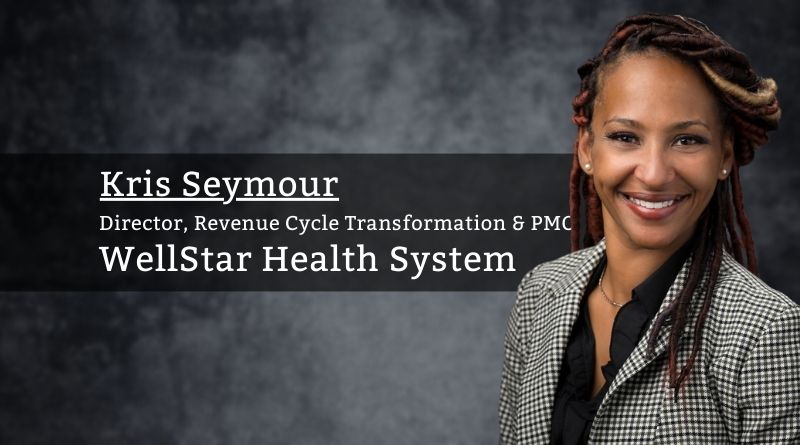From Clicks to Care: Unleashing the Power of Digital Transformation in Healthcare
By Kris Seymour, Director, Revenue Cycle Transformation and PMO, WellStar Health System
Introduction
In today’s fast-paced world, the healthcare industry is undergoing a profound digital transformation, revolutionizing how healthcare services are delivered. The convergence of healthcare and technology, known as HealthTech, has created new opportunities to improve patient care.
Seamless Access: Empowering Patients in the Digital Age
Digital transformation aims to empower patients by making healthcare more accessible and convenient. Much like social media has transformed how we connect with others, healthcare is embracing digital platforms to provide seamless access to care and information. Patient portals, mobile applications, and telemedicine services allow patients to access their medical records, schedule appointments, receive test results, and even consult healthcare providers from anywhere.
Seamless access brings numerous benefits. Patients in rural or remote areas can access specialized care that was previously unavailable to them. Individuals with chronic conditions can actively manage their health through remote monitoring devices and personalized health apps. Telemedicine has also emerged as a game-changer, enabling virtual consultations and reducing the burden on healthcare facilities, especially during the ongoing COVID-19 pandemic.
Digital transformation in healthcare has revolutionized the industry, providing seamless access for patients and personalized engagement to improve healthcare outcomes.
Customized Digital Experiences: Engaging Diverse Audiences
Customization is a critical aspect of digital transformation in healthcare, as it enhances patient engagement and improves outcomes. A study published in the Journal of Medical Internet Research highlights the importance of personalization in digital healthcare. The research conducted by Peleg et al. (2018) demonstrates that customized digital experiences based on patient preferences and needs result in higher levels of engagement and better adherence to treatment plans.
Healthcare organizations are increasingly leveraging data analytics and AI to analyze patient data and deliver personalized care. This approach tailors content to individual patients and encompasses user-friendly interfaces, intuitive navigation, and personalized recommendations. By understanding the unique needs of different patient demographics, healthcare providers can design digital experiences that cater to their preferences, fostering better engagement and ultimately leading to improved health outcomes.
For instance, older patients may benefit from larger font sizes and simplified interfaces to accommodate age-related visual impairments and ease of use. On the other hand, tech-savvy millennials may appreciate interactive features and real-time updates to stay actively involved in their healthcare management.
By embracing customization in digital healthcare, healthcare organizations demonstrate a commitment to providing patient-centered care that meets the diverse needs of their patient populations. This personalized approach, supported by research findings, has the potential to drive better patient engagement, satisfaction, and overall healthcare outcomes.
Engagement through Gamification and Social Interaction
Gamification and social interaction are effective and fun elements of digital transformation that enhance patient engagement. Imagine healthcare becoming as exciting as playing a game! Gamification involves incorporating game-like elements such as rewards, challenges, and progress tracking into healthcare applications. Turning health-related tasks into interactive experiences motivates patients to adopt healthy behaviors and adhere to treatment plans.
Through gamification, patients can earn points, badges, or virtual rewards for completing health-related tasks, achieving milestones, or reaching personal goals. This approach makes healthcare more enjoyable and encourages patients to actively participate in their own care. It creates a sense of achievement and satisfaction, boosting motivation and adherence to treatment regimens.
The combination of gamification and social interaction in digital healthcare makes healthcare more enjoyable, interactive, promotes positive behavior change, adherence to treatment plans, and overall well-being. It transforms the patient experience from a passive one into an active, collaborative, and empowering journey.
Addressing Disparities: Ensuring Equitable Access and Engagement
It is crucial to acknowledge that the benefits of digital transformation in healthcare have not been equitably distributed among all communities. Underserved communities, particularly black and brown populations, often face significant health disparities and barriers to accessing digital healthcare.
Several studies have highlighted these disparities. A report published by the National Academy of Medicine titled “Unequal Treatment: Confronting Racial and Ethnic Disparities in Healthcare” emphasizes the higher rates of health disparities and poorer health outcomes experienced by underserved communities, including black and brown populations. The report underscores the need for targeted interventions and an inclusive approach to address these disparities and promote equitable healthcare access and outcomes.
To bridge the gap, healthcare organizations must actively eliminate systemic barriers and promote equitable access to digital healthcare technologies and services. Initiatives can include providing digital literacy programs to enhance digital skills and knowledge and engaging with communities to build trust and address cultural sensitivities.
Moreover, collaboration between healthcare organizations, community leaders, and policymakers is essential to develop comprehensive strategies that address the multifaceted challenges faced by underserved communities. By focusing on inclusivity, healthcare organizations can ensure that digital healthcare initiatives are designed to meet specific needs and overcome the barriers faced by marginalized populations.
Conclusion
Digital transformation in healthcare has revolutionized the industry, providing seamless access for patients and personalized engagement to improve healthcare outcomes. By leveraging digital platforms, patients can conveniently access their care and information, empowering them to take an active role in their healthcare journey.
However, it is important to address the challenges that arise with digital transformation. Privacy and security concerns must be carefully managed to protect patient data. Bridging the digital divide ensures equal access and engagement for all patient populations, particularly in underserved communities. Interoperability and ethical considerations should be prioritized to create a cohesive and trustworthy digital healthcare ecosystem.
Despite these challenges, the potential of digital transformation in healthcare is vast. Through customization and personalization, healthcare organizations can deliver tailored experiences that cater to the unique needs of diverse patient populations. By addressing disparities and ensuring equitable access, digital transformation can improve healthcare experiences and outcomes for all. As the digital landscape continues to evolve, healthcare organizations must embrace the opportunities presented by digital transformation. By staying ahead of technological advancements and continuously addressing the needs of patients, the healthcare industry can truly leverage the potential of digital transformation to create a patient-centric and



